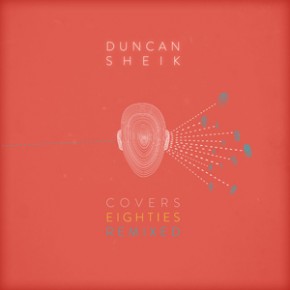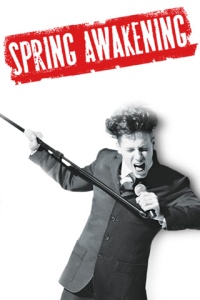brent johnson chats with the singer-songwriter about his new musical adaptation of American Psycho, the movie version of Spring Awakening, and the new album he’s about to record …
Duncan Sheik laughs out loud when he thinks about the last place he heard one of his songs playing. It was a few days ago, on the most recent episode of the polarizing HBO television show Girls.
And the scene happened to feature a strange, psuedo-torture chamber filled with videos of maggots, decomposing animals, and a crying baby — with Sheik’s 1996 hit “Barely Breathing” blaring over all of it.
“It was hilarious,” the award-winning singer-songwriter says of the clip, which sent the Internet abuzz this week. “It was great. It was a really fun scene. It’s hard to explain it.”
But please do …

“There’s an avant garde visual artist who is trying to seduce one of these girls,” Sheik explains. “He puts her in this kind of weird visual torture chamber, with all these horrible videos being played. And he turns ‘Barely Breathing’ on super loud in the torture chamber. And that’s his art piece.”
Sheik didn’t take offense.
“I totally understood it,” he says with a laugh, “because that’s often how I’ve felt when I’ve had to play the song.”
More than 15 years have passed since Sheik scored one of the 1990s’ biggest hits with “Barely Breathing,” an airy yet catchy track from his otherwise hushed, string-laden debut album. But lately, the song has seen a pop-culture revival. A few months before it appeared on Girls, the cast of Glee belted out its own rendition.
Of course, Sheik — who is currently on a mini-tour, including a stop Saturday in New Hope, Pa. — still plays the song live. Even though not too long ago, it was the bane of his existence.
In the few years after the single’s success, Sheik struggled to find his place. While his next few albums featured strong material, they failed to produce another smash. And trying to buck his image, he even released a record of lush orchestral songs with lyrics by playwright Steven Sater called Phantom Moon in 2001.
http://youtu.be/LaZ02WgVpK4
Then, in 2006, Sheik’s whole career changed. He and Sater wrote Spring Awakening, a stirring musical adaptation of a German play from the early 1900s about teenagers discovering their sexuality. It was a massive hit on Broadway, winning Best Musical at the Tony awards. Sheik himself took home two statues — for Best Score and Best Orchestration.
The 43-year-old — a smart, soft-spoken music geek who once studied semiotics at Brown — has spent the last few years composing both theater and pop music. His most recent project: turning the blood-splattered film American Psycho into a musical. It’s slated to open in London later this year. Sheik is also about to enter the studio to record a new pop album.
He spoke with Pop-Break’s Brent Johnson about breaking from the shadow of “Barely Breathing,” whether American Psycho will be as gory as the film version, whether the world will ever see a Spring Awakening movie, and where he keeps his Tonys.
Pop-Break: Our website is based in New Brunswick, N.J. — which means we’re always proud to speak with fellow Jerseyans. You were born in Montclair, right?
Duncan Sheik: I was born in Mountainside Hospital, which is in Montclair. But I grew up more in the North Caldwell area. Well, that’s where I was as a kid before I moved to Hilton Head, S.C., which is where I really grew up. But I was born in New Jersey.
PB: So, do you consider yourself an honorary New Jerseyan?
DS: [laughs] That’s a complicated question to answer. I mean, I was born in New Jersey, and people like to rag on New Jersey, and I like to defend it. But from kind of a musical standpoint, there are some things where I feel disconnected from the New Jersey sound. [laughs] I’m such an Anglophile, and the music that comes from New Jersey — whether it’s Bon Jovi or Bruce Springsteen, or whatever — with all due respect to those artists, it’s not where I kind of come from, and it’s not really where I live. So that’s where there’s sort of cognitive dissonance.
PB: I can understand that. Even if you don’t like Springsteen, if you’re from New Jersey, it’s almost a requirement to think he’s God.
DS: I came around to appreciate Bruce Springsteen more kind of lately. But it took me a really long time to get there. I always understood the appeal of it. I just was interested in things that were more kind of elegant and seductive and ambiguous, and Bruce’s music was always kind of earthy and just kind of right in your face. I always liked things that were a little more elusive.
PB: Do you dislike playing “Barely Breathing” 15 years later?
DS: Actually, now I quite like playing it. But there was a period of time where I was trying to move on and do other things. And for a minute, “Barely Breathing” was the only thing that the wider culture knew about me. So, it wasn’t until after Spring Awakening that I started to just enjoy playing “Barely Breathing” and enjoy it for what it was.
PB: The last time I interviewed you was when you came to Rutgers University here to play a small acoustic set in 2003. So, it was that period where you were a few years past “Barely Breathing” and a few years before Spring Awakening. I remember that you talked about the need to break away from that period in your career. Is that something you felt you struggled with for a while?
DS: Yeah. You know, I was a kid who grew up listening to The Cure and New Order and Depeche Mode and Talk Talk — pretty left-field, kind of Anglo-European music. Then, all of a sudden, my first record came out, and I was put in this very kind of Top 40 context. And I just didn’t really feel comfortable there. It wasn’t what I was interested in. So, for better or worse, I spent a lot of time subverting that and doing things that were not commercial in that way very much on purpose.
PB: The idea of writing a musical — composing a series of songs that have to tie together and feed off each other — seems like a huge undertaking. Did you find that daunting?
DS: Not really, because most of the things I’ve done have been adaptations, so there’s already a narrative there that exists. And also, in many of these cases, I’m just functioning as the composer, not having to deal with the words or the text or the narrative really at all. And even when I’m writing lyrics, it’s kind of more up to the book writer or the director how to tell that story and where the story goes. Usually, I leave that to the people who know what they’re doing in that department.
PB: Do you find songwriting easy? Or do you pace around the room a lot?
DS: I find writing music to be very easy. I find writing lyrics to be at times very painstaking. But it depends on the song.
PB: Did you write the lyrics to the upcoming American Psycho musical?
DS: I have done that.
PB: What is the state of that show?
DS: We are going to do our first production in London at the Almeida Theater in October. It’s very different for me because the pit band is just using drum machines and a lot of synthesizers. It’s a kind of different way to do a Broadway show.
PB: Why electronic music for this show?
DS: Electronic music is so much a part of the world that Patrick Bateman lives in. It’s also what is always in his headphones listening to. He’s listening to this kind of cheesy ’80s music — and he fancies himself a real kind of music critic. But in fact what he says, it’s all kind of nonsense and gibberish.
PB: Do you see this show eventually reaching Broadway?
DS: I would love for it to come to Broadway, and/or the West End [London’s equivalent of Broadway]. But you’ve got to see how it goes, how the actors behave. And if they do, you’re in good shape.
PB: Is the show pretty faithful to the movie? Will it be as graphic?
DS: That’s a great question, and I think not having staged it properly yet, I think we’re going to experiment with that issue. But again, it’s kind of up to the director to set the tone of what the piece is going to be. I just told them, “Look, I don’t want to be involved in something that’s just like a cheeky musical about the ’80s, where you’re just kind of rehashing the ’80s nonsense that went on.”
PB: Will the production in October be a workshop?
DS: No, no, it’s a real production. Which is slightly terrifying because that’s really soon. It’s going to come up quick. But we’re going to get our act together and make it happen.
PB: There has also been a lot of talk about a film version of Spring Awakening. Is that going to happen?
DS: It is in the works. It’s very complicated. There are a lot of moving parts. So, I’m really supposed to just shut up about it right now. [laughs] We were supposed to maybe be shooting this spring. It doesn’t look like that’s going to happen. We’re probably waiting for 2014 at this point.
I really want there to be a Spring Awakening movie. I think it will make a great movie. But there are a few steps that need to be taken before that can actually happen.
PB: Where do you keep the Grammy and the Tony awards you won for that show?
DS: [laughs] I have a recording studio up in Garrison, N.Y., which is like an hour north of the city. They’re just kind of sitting on a piece of furniture there. It’s kind of like an old-time bar, where you have kind of a crystal tray, and you have your various liqueurs arranged in some way. It’s kind of like a cool piece of furniture, and I have some books, and the awards just sort of sit on top of the books. They’re kind of hiding in plain sight.
PB: You started your career at a time when the music industry was in a much different place. Do you feel you witnessed a sea change?
DS: Oh yes, it’s a huge sea change. It’s enormous. You’ve got — I don’t know — 50 or 60 artists and bands who command many, many, many millions of dollars every tour they do and automatically sell hundreds of thousands of records. Then you have no kind of middle class whatsoever, and then you have 900 million kind of baby bands trying to make it happen and get their stuff out there. But yeah, it’s a very different landscape than what it was when I first got in this business.

PB: Do you have any advice for anyone starting out in this industry?
DS: My advice would be that they do music that is original and interesting and distinctive to them and not try to copy some other style or some other vibe that already exists by another artist out there. I see a lot of the same tropes being kind of used over and over again.
PB: Do you have any plans for another pop album?
DS: That’s exactly what I’m doing now, when I get back from this little mini tour. I’m just going to hunker down and record my next record in Garrison. And it’s going to sound great.
PB: Is there an album or a song that you’re particularly proud of?
DS: I’m proud of all my records, but I will say I tend in live shows to play a lot of songs from [the 2002 album] Daylight. I think that means something. I think that means that was a really well-crafted and kind of important record for me.
PB: That’s actually my favorite record of yours, as well. Why do you think it was important?
DS: I just think I finally got to a place where I was able to marry my kind of arty-farty impulses with my more kind of commercial, pop impulses — marry them together effectively. Of course, having a great producer and great musicians around you, that helps a lot. But that was the moment where I found a sound that I was really happy with and, personally, has kind of stood the test of time.
PB: Do you have a favorite record by someone else?
DS: Probably the Talk Talk album called Laughingstock. A little bit obscure, but it’s really an amazing record.
PB: Most people seem to know Talk Talk from the No Doubt cover of “It’s My Life.”
DS: Most people know that, but those original Talk Talk records are extraordinary.
PB: You did an album of ’80s covers for your last record. Are there any plans to do an album of ’70s or even ’90s covers?
DS: I think I’m done with covers for a very, very long time. [laughs]
PB: Why is that?
DS: Well, I need to go make a new Duncan Sheik record that is not related to a theater piece and is not a covers album. It’s a new album of new material, and I think that’s what people really want to hear from me.
PB: Was there ever a point when you started out that you thought your career would include a film score and Broadway musicals?
DS: I never, never, never, never did. The whole theater thing happened totally by accident.
PB: How did it happen?
DS: I had a fellow Buddhist friend of mine named Steven Sater who was a playwright. And he said, “We should take Spring Awakening and we should adapt it as a musical.” And that began this kind of seven-year-long saga of trying to mount it in some professional way.
RELATED STORIES:
Brent Johnson’s Lost Songs: ‘The Bitch Of Living’ from Spring Awakening








